Abstract
BACKGROUND--Many studies have shown that emotional factors play a part in asthma, but few have compared patients with differing severities of asthma. It was our impression that patients with "brittle" asthma (BA; more than 40% diurnal variation in peak flow on 15 or more days a month over a period of at least six months, and persistent symptoms despite multiple drug treatment) had greater psychosocial morbidity than asthmatic patients with less variable asthma. METHODS--Twenty patients with BA and a control group of less severe asthmatic subjects matched for age, sex, and duration of illness were asked to complete the General Health Questionnaire (GHQ), a screening test for psychiatric disorders, the Eysenck Personality Inventory which measures extraversion and neuroticism, and to participate in a life events interview and a structured clinical interview (SCID) to diagnose psychiatric disorder. RESULTS--The mean (SD) age was 45.6 (12.3) years for the BA group, and 45.7 (13.1) years for the control group. All patients were receiving inhaled steroids and regular beta 2 agonists; nine patients with BA but no control patients were taking oral steroids, and 12 of the patients with BA but no controls were receiving beta 2 agonists by subcutaneous infusion or injection. Eight of the patients with BA scored more than 11 on the GHQ compared with five of the control group (NS). Significantly more subjects with BA (12/20) than controls (5/20) had intercurrent or past psychiatric disorder, and 7/20 subjects with BA had a lifetime history of anxiety disorder compared with 3/20 controls. Life events analysis showed no overall difference in the total number, but the patients with BA had significantly more life events related to asthma. There was no difference in personality profiles between the two groups. CONCLUSIONS--The results suggest that patients with "brittle" asthma have greater psychiatric morbidity than those with less severe asthma, but that their personality profiles and overall life event experiences are similar.
Full text
PDF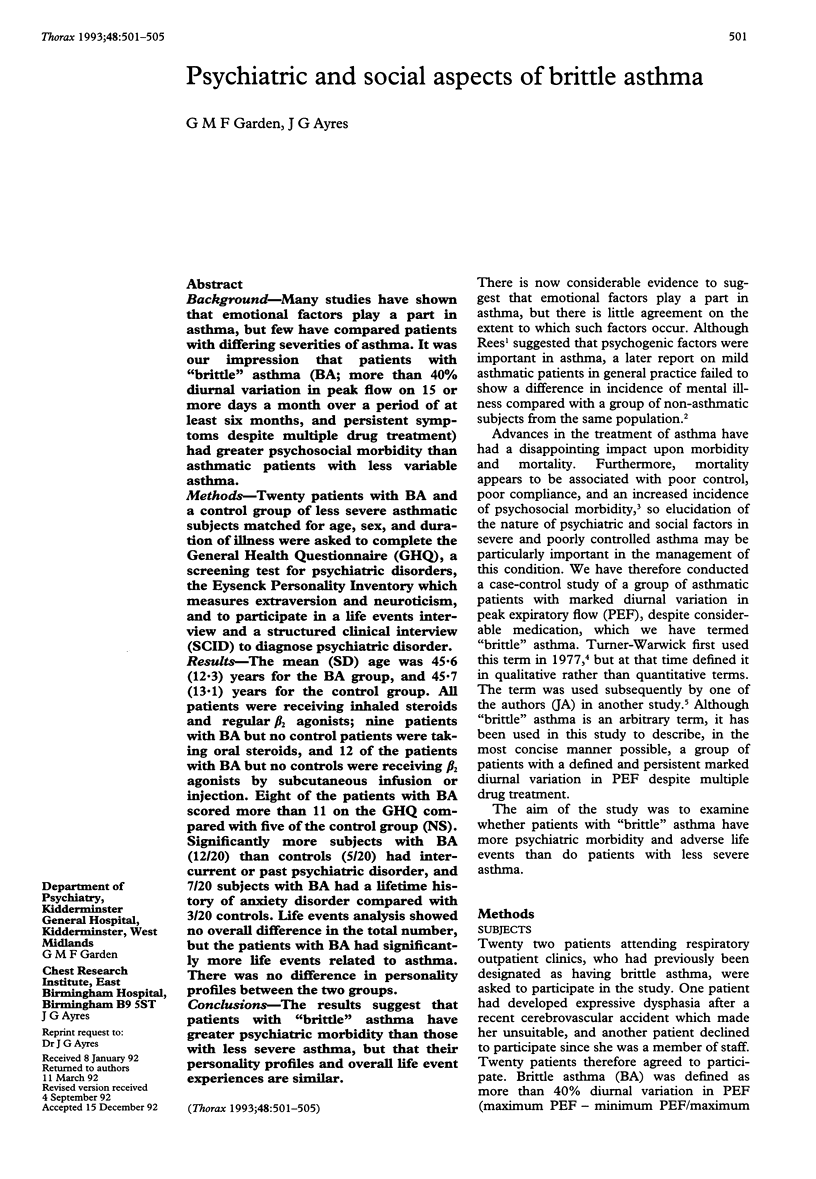
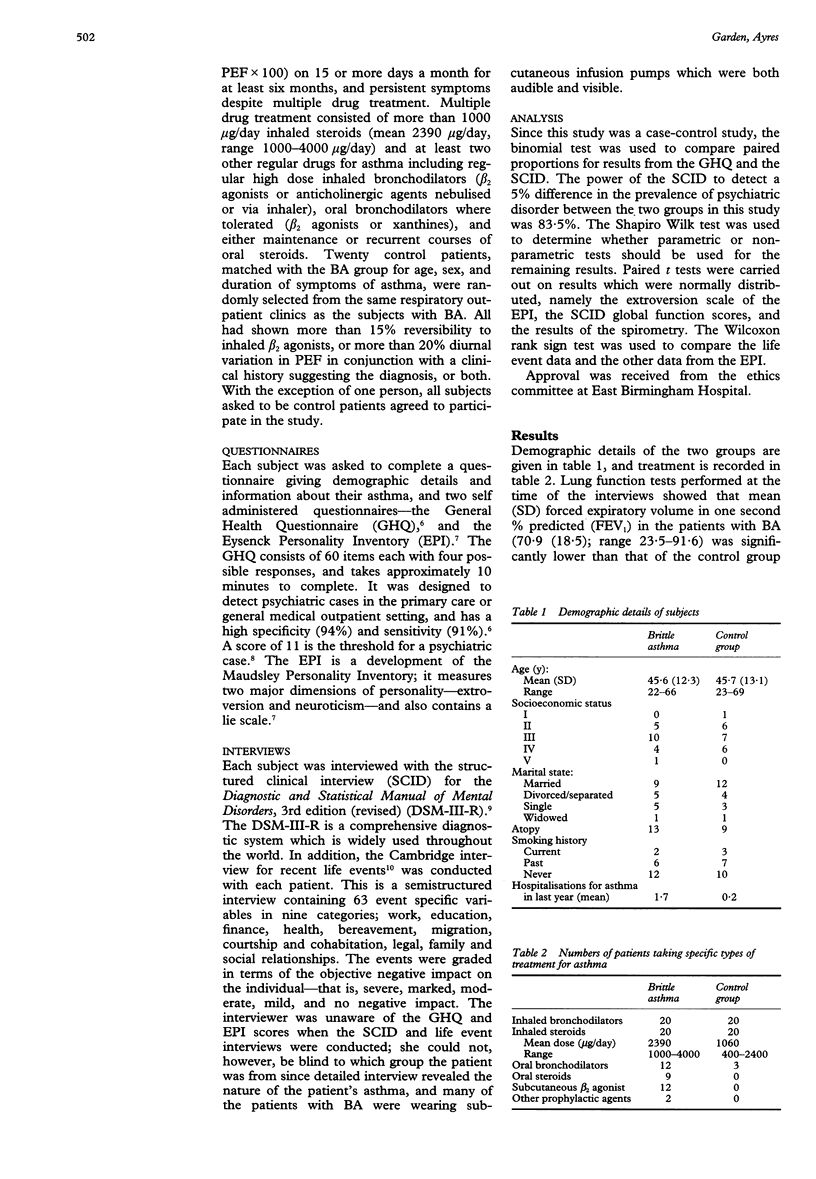
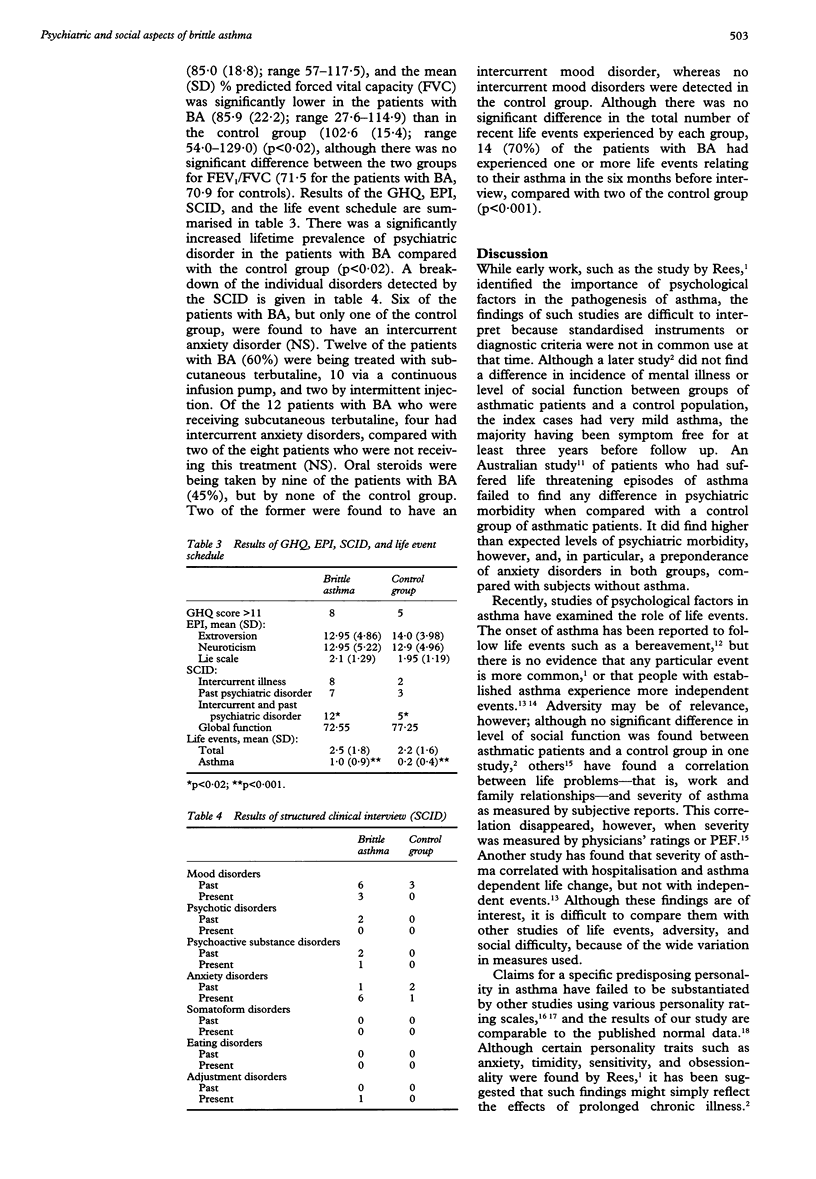
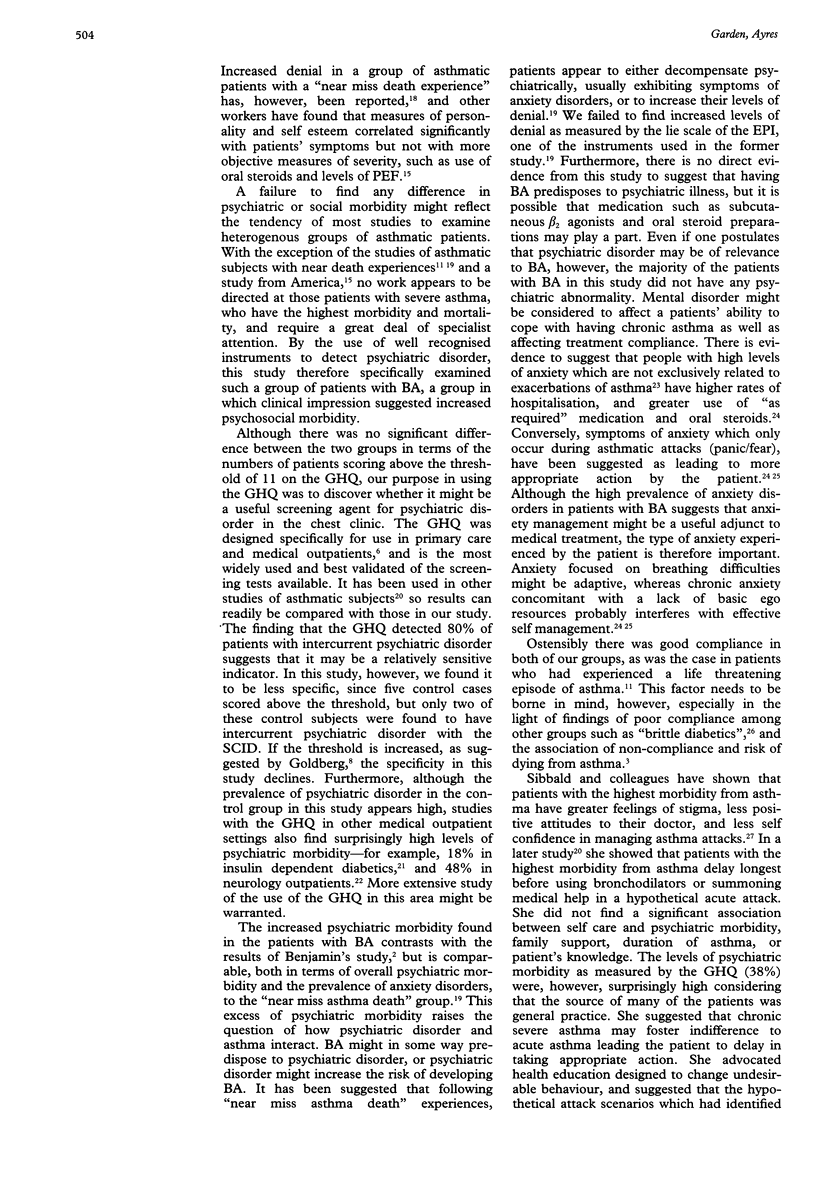
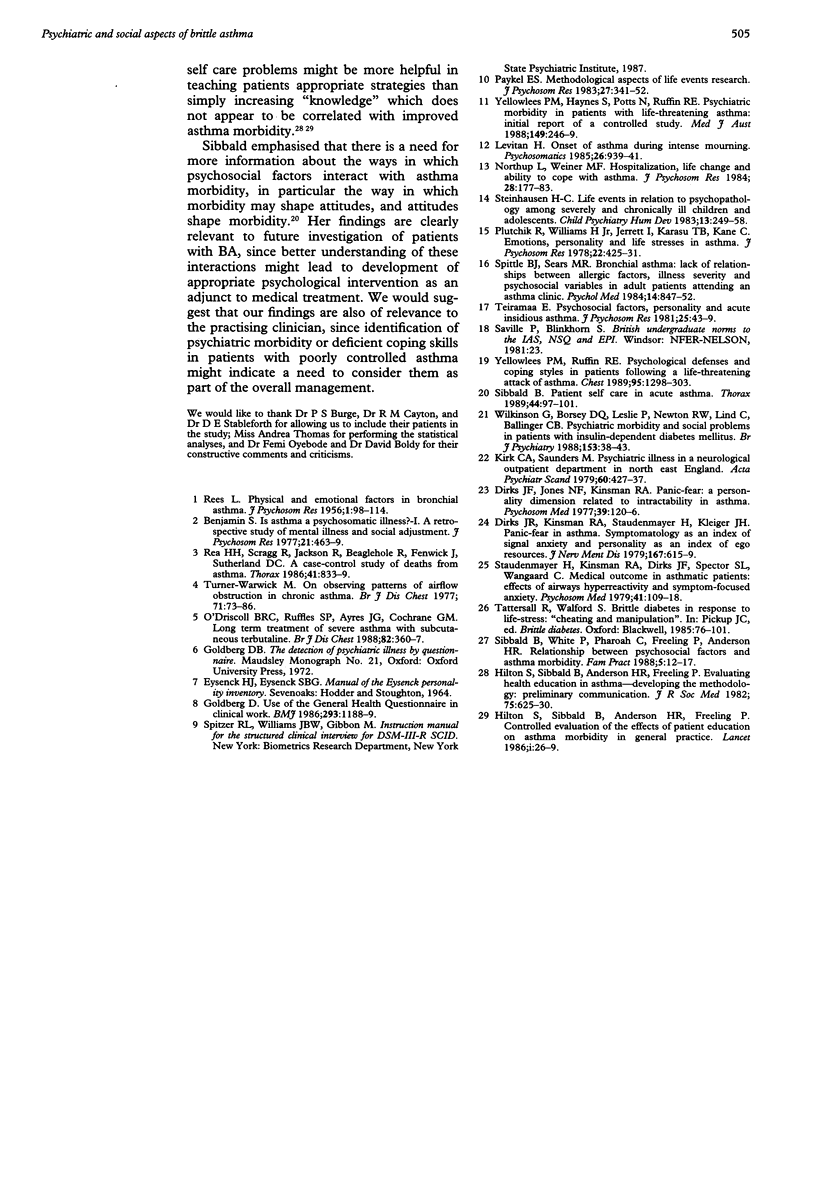
Selected References
These references are in PubMed. This may not be the complete list of references from this article.
- Benjamin S. Is asthma a phychosomatic illness?--I. A retrospective study of mental illness and social adjustment. J Psychosom Res. 1977;21(6):463–469. doi: 10.1016/0022-3999(77)90069-1. [DOI] [PubMed] [Google Scholar]
- Dirks J. F., Jones N. F., Kinsman R. A. Panic-fear: a personality dimension related to intractability in asthma. Psychosom Med. 1977 Mar-Apr;39(2):120–126. doi: 10.1097/00006842-197703000-00006. [DOI] [PubMed] [Google Scholar]
- Dirks J. F., Kinsman R. A., Staudenmayer H., Kleiger J. H. Panic-fear in asthma. Symptomatology as an index of signal anxiety and personality as an index of ego resources. J Nerv Ment Dis. 1979 Oct;167(10):615–619. [PubMed] [Google Scholar]
- Goldberg D. Use of the general health questionnaire in clinical work. Br Med J (Clin Res Ed) 1986 Nov 8;293(6556):1188–1189. doi: 10.1136/bmj.293.6556.1188. [DOI] [PMC free article] [PubMed] [Google Scholar]
- Hilton S., Sibbald B., Anderson H. R., Freeling P. Controlled evaluation of the effects of patient education on asthma morbidity in general practice. Lancet. 1986 Jan 4;1(8471):26–29. doi: 10.1016/s0140-6736(86)91904-5. [DOI] [PubMed] [Google Scholar]
- Hilton S., Sibbald B., Anderson H. R., Freeling P. Evaluating health education in asthma -- developing the methodology: preliminary communication. J R Soc Med. 1982 Aug;75(8):625–630. [PMC free article] [PubMed] [Google Scholar]
- Kirk C. A., Saunders M. Psychiatric illness in a neurological out-patient department in North East England. Use of the General Health Questionnaire in the prospective study of neurological out-patients. Acta Psychiatr Scand. 1979 Nov;60(5):427–437. doi: 10.1111/j.1600-0447.1979.tb00553.x. [DOI] [PubMed] [Google Scholar]
- Levitan H. Onset of asthma during intense mourning. Psychosomatics. 1985 Dec;26(12):939–941. doi: 10.1016/S0033-3182(85)72759-4. [DOI] [PubMed] [Google Scholar]
- Northup L., Weiner M. F. Hospitalization, life change and ability to cope with asthma. J Psychosom Res. 1984;28(3):177–183. doi: 10.1016/0022-3999(84)90017-5. [DOI] [PubMed] [Google Scholar]
- O'Driscoll B. R., Ruffles S. P., Ayres J. G., Cochrane G. M. Long term treatment of severe asthma with subcutaneous terbutaline. Br J Dis Chest. 1988 Oct;82(4):360–367. doi: 10.1016/0007-0971(88)90089-7. [DOI] [PubMed] [Google Scholar]
- Paykel E. S. Methodological aspects of life events research. J Psychosom Res. 1983;27(5):341–352. doi: 10.1016/0022-3999(83)90065-x. [DOI] [PubMed] [Google Scholar]
- Plutchik R., Williams M. H., Jr, Jerrett I., Karasu T. B., Kane C. Emotions, personality and life stresses in asthma. J Psychosom Res. 1978;22(5):425–431. doi: 10.1016/0022-3999(78)90065-x. [DOI] [PubMed] [Google Scholar]
- REES L. Physical and emotional factors in bronchial asthma. J Psychosom Res. 1956 Jun;1(2):98–114. doi: 10.1016/0022-3999(56)90011-3. [DOI] [PubMed] [Google Scholar]
- Rea H. H., Scragg R., Jackson R., Beaglehole R., Fenwick J., Sutherland D. C. A case-control study of deaths from asthma. Thorax. 1986 Nov;41(11):833–839. doi: 10.1136/thx.41.11.833. [DOI] [PMC free article] [PubMed] [Google Scholar]
- Sibbald B. Patient self care in acute asthma. Thorax. 1989 Feb;44(2):97–101. doi: 10.1136/thx.44.2.97. [DOI] [PMC free article] [PubMed] [Google Scholar]
- Sibbald B., White P., Pharoah C., Freeling P., Anderson H. R. Relationship between psychosocial factors and asthma morbidity. Fam Pract. 1988 Mar;5(1):12–17. doi: 10.1093/fampra/5.1.12. [DOI] [PubMed] [Google Scholar]
- Spittle B. J., Sears M. R. Bronchial asthma: lack of relationships between allergic factors, illness severity and psychosocial variables in adult patients attending an asthma clinic. Psychol Med. 1984 Nov;14(4):847–852. doi: 10.1017/s0033291700019826. [DOI] [PubMed] [Google Scholar]
- Staudenmayer H., Kinsman R. A., Dirks J. F., Spector S. L., Wangaard C. Medical outcome in asthmatic patients: effects of airways hyperreactivity and symptom-focused anxiety. Psychosom Med. 1979 Mar;41(2):109–118. doi: 10.1097/00006842-197903000-00004. [DOI] [PubMed] [Google Scholar]
- Steinhausen H. C. Life events in relation to psychopathology among severely and chronically ill children and adolescents. Child Psychiatry Hum Dev. 1983 Summer;13(4):249–258. doi: 10.1007/BF00709559. [DOI] [PubMed] [Google Scholar]
- Teiramaa E. Psychosocial factors, personality and acute-insidious asthma. J Psychosom Res. 1981;25(1):43–49. doi: 10.1016/0022-3999(81)90082-9. [DOI] [PubMed] [Google Scholar]
- Turner-Warwick M. On observing patterns of airflow obstruction in chronic asthma. Br J Dis Chest. 1977 Apr;71(2):73–86. doi: 10.1016/0007-0971(77)90086-9. [DOI] [PubMed] [Google Scholar]
- Wilkinson G., Borsey D. Q., Leslie P., Newton R. W., Lind C., Ballinger C. B. Psychiatric morbidity and social problems in patients with insulin-dependent diabetes mellitus. Br J Psychiatry. 1988 Jul;153:38–43. doi: 10.1192/bjp.153.1.38. [DOI] [PubMed] [Google Scholar]
- Yellowlees P. M., Haynes S., Potts N., Ruffin R. E. Psychiatric morbidity in patients with life-threatening asthma: initial report of a controlled study. Med J Aust. 1988 Sep 5;149(5):246–249. doi: 10.5694/j.1326-5377.1988.tb120596.x. [DOI] [PubMed] [Google Scholar]
- Yellowlees P. M., Ruffin R. E. Psychological defenses and coping styles in patients following a life-threatening attack of asthma. Chest. 1989 Jun;95(6):1298–1303. doi: 10.1378/chest.95.6.1298. [DOI] [PubMed] [Google Scholar]


